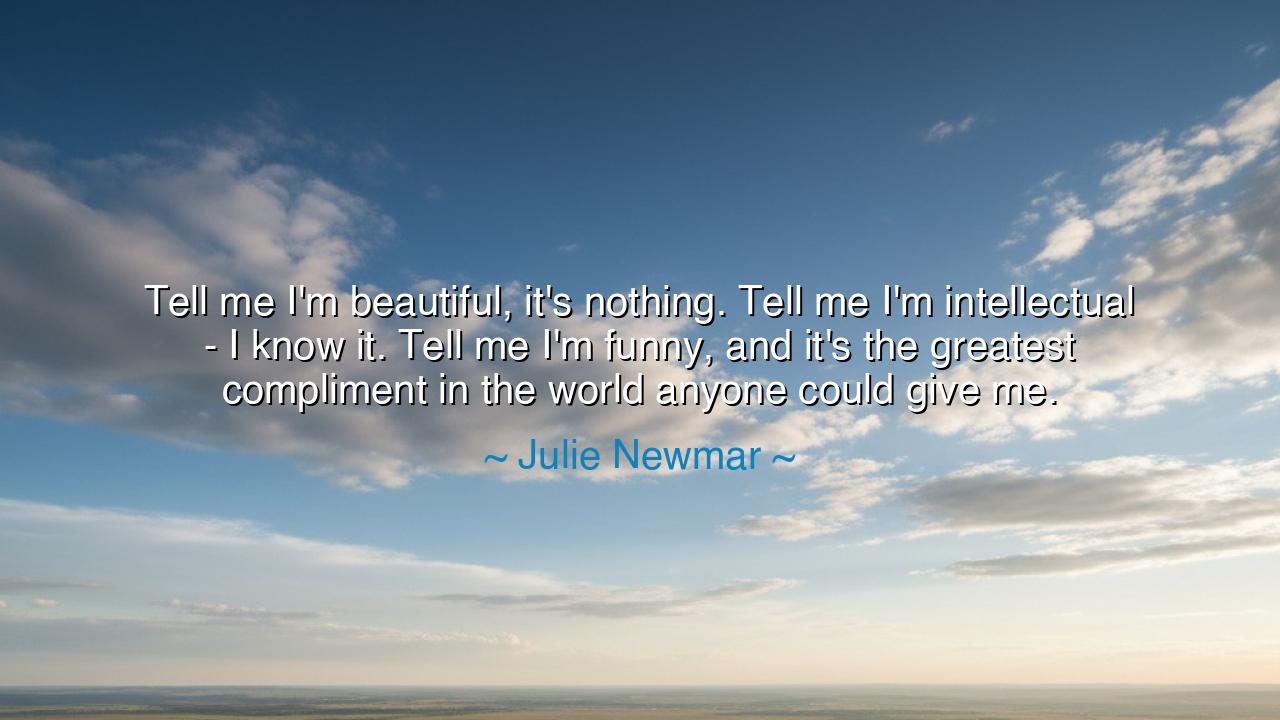
Tell me I'm beautiful, it's nothing. Tell me I'm intellectual - I
Tell me I'm beautiful, it's nothing. Tell me I'm intellectual - I know it. Tell me I'm funny, and it's the greatest compliment in the world anyone could give me.






When Julie Newmar said, “Tell me I’m beautiful, it’s nothing. Tell me I’m intellectual — I know it. Tell me I’m funny, and it’s the greatest compliment in the world anyone could give me,” she was not speaking only as an actress or a woman, but as a soul yearning for connection beyond illusion. Her words peel back the layers of human praise and reveal what is most rare and sacred in the human heart — humor, the spark of divine intelligence that bridges minds and heals spirits. Beauty fades, intellect can be known, but laughter — laughter shared — is eternal. In this statement lies the ancient truth that wit is the meeting place of hearts, where vanity and reason fall away and only joy remains.
The origin of this thought comes from Newmar’s own experience as one of the most striking icons of her age — the original Catwoman, whose beauty was the object of constant attention and desire. For much of her life, the world praised her for her face, her form, her allure. Yet beneath the glamour lived a keen and curious mind, a thinker who saw beyond surfaces. When she says that being called beautiful “is nothing,” she speaks with the weary wisdom of one who has learned that praise for appearance is fleeting and hollow. When she admits that being called intellectual “she already knows,” it is the confidence of a self-aware spirit. But when she reaches the word “funny,” her tone changes — there, at last, is vulnerability, humanity, and gratitude. To be called funny, to her, is to be recognized for life itself, for the light that dances between sorrow and wisdom.
The ancients understood this same reverence for laughter. The philosopher Aristotle called humor “the play of the mind,” and the gods of Olympus themselves were said to laugh as they watched the folly of men. In ancient Egypt, laughter was sacred; it was believed to awaken the soul and drive away evil. To make another laugh was to heal them, to breathe life where heaviness dwelled. So when Newmar treasures the compliment of being funny above all others, she aligns herself with this timeless understanding: that humor is not a trivial gift, but a divine one, for it demands not only quickness of mind, but empathy of heart.
We may think of Queen Elizabeth I, whose wit ruled England as surely as her crown. She knew that intellect could command respect, and beauty could inspire desire, but humor could disarm enemies and unite nations. Her clever replies, often wrapped in grace and irony, transformed her into more than a monarch — she became a legend. Her laughter was not mere mirth, but mastery, a means of power born from self-awareness. Julie Newmar’s insight echoes this truth: humor is a mark of mastery, a sign of a spirit both wise and free, capable of finding light even in the shadows.
There is also humility in Newmar’s words. To be funny is not to dominate, but to connect. It is a gift that exists only in relationship — the speaker and the listener, the giver and the receiver. Beauty is solitary, intellect can be distant, but laughter must be shared. It is communion. It means that one’s soul has reached another’s, that understanding has been achieved without struggle. For laughter is truth delivered with tenderness, wisdom disguised as delight. When someone finds you funny, they are saying: You have reached me. I see you.
To those who seek meaning in her words, let this be your lesson: do not live for the hollow praise of beauty, nor rest complacent in your intellect. Strive instead to cultivate warmth, timing, and perspective, for these are the roots of true humor. Learn to laugh at yourself, to lighten the burdens of others, to turn pain into play. These are not small things — they are the pillars of resilience. For the world grows dark when laughter dies, and those who can bring laughter back are healers disguised as jesters.
And so, dear listener, remember this: to be called beautiful pleases the senses, to be called intelligent honors the mind, but to be called funny blesses the soul. It is proof that you have walked through sorrow and come out shining, that you have seen life’s absurdities and chosen to laugh. Julie Newmar’s truth is not vanity but revelation — that beauty and intellect fade in the memory, but the joy we give through laughter endures forever. Therefore, go forth and live with wit, courage, and compassion — for the world will forget your face and your words, but never the laughter you leave behind.






AAdministratorAdministrator
Welcome, honored guests. Please leave a comment, we will respond soon